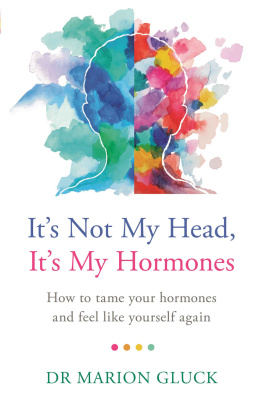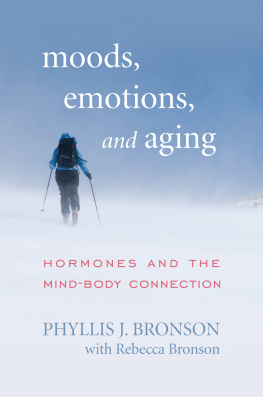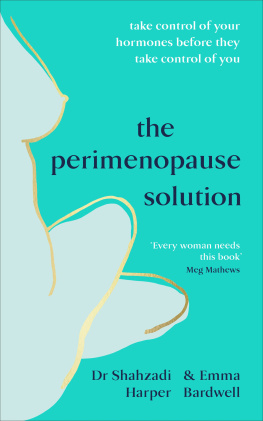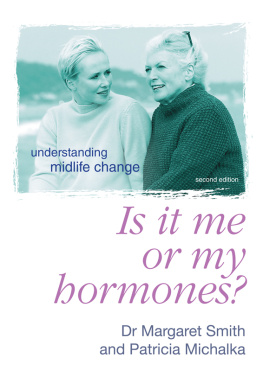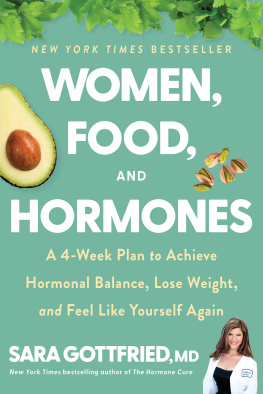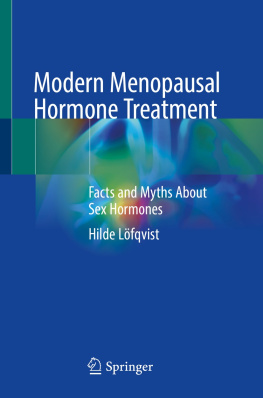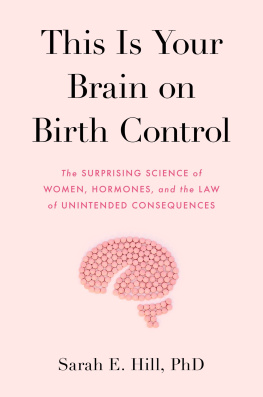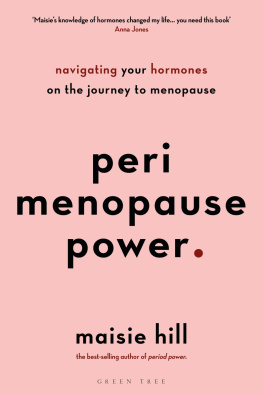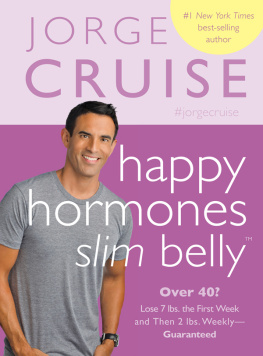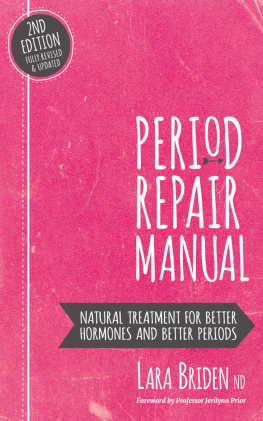To every woman
CONTENTS
Hormones are finally getting the attention they deserve. They are of great importance to our health and well-being. They provide the background music to all womens lives.
Our sex hormones come on-stream at puberty, when oestrogen in particular sculpts lips, breasts and the extra fat beneath the skin. This is when their production normally settles into a monthly rhythm that switches between oestrogen and progesterone and the moods that flow with them. Hormones also orchestrate the far larger changes physical and emotional that accompany pregnancy and childbirth. In our middle age their production begins to fall off, and as we head into menopause, their music gradually fades.
Menopause is best known as the change, a time of hormonal transformation and physical and mental adjustment. But women are hormonal beings all through their lives, and puberty, pregnancy and perimenopause may also be times of hormonal upheaval and imbalance. This book will talk about the journey of how hormones change throughout your life and how they impact on your mind as well as your body. Often the years in the run-up to menopause can be the most challenging time in a womans life, and I will talk about this as the book goes on.
It is not unusual for some women at menopause to be ashamed to find themselves without their sex hormones and thus feel redundant as sexual, attractive and loving beings. They may feel their use-by date has been reached and that they are no longer sexually wanted or needed.
This book is here to help women (and men) understand that they are not losing their mind or going crazy. Hormones have a profound impact on the way we feel, think and act.
Its about time we educated ourselves on the effects of our hormones and their relationship to our body and our brain chemistry so we can embrace these sparks of life. Its about time we listened to these chemical messengers and understood what they are saying.
Today there is a growing awareness of mental health issues and their consequences. The diagnosis of depression and the use of antidepressants is on the rise. Why is this so? Why are one in four people suffering? Awareness is great and important but there is still not enough understanding about possible causes and factors contributing to this mental health epidemic, such as our hormonal health, lifestyle and stressors.
My hope is that through this book, hormones and their effect on brain chemistry will be simplified and demystified for you; that you will understand how hormones affect you and your moods and actions as an individual; how science, politics and commercial interests have limited your options; and how your choice of how you manage your hormones can help you take control of your physical and mental well-being.
In 2010 I wrote It Must Be My Hormones. I wanted women to know and understand the impact hormones have on their physical welfare. I felt it was important to demystify bio-identical hormones, which are identical to our own naturally occurring hormones and are derived from plant or phyto extracts, specifically found in soy and yams. This differentiates them from the synthetic hormones used in conventional hormone replacement therapy (HRT), which have a different molecular structure to body-identical (bio-identical) hormones. Synthetic hormones are manmade drugs which act as hormones but can have severe side effects compared to the hormones our body produces naturally.
I wanted to take the fear factor out of hormone therapy. But there is still much left unsaid and misunderstood. This is why I have decided to write about the connections between mind, mood and hormones.
Today we have far greater knowledge of the various ways the smooth working of our hormones can become disrupted by pollutants or plastics in our environment and by our lifestyle especially diet and stress. Yet we still face an ocean of confusion when hormonal levels drop, or their rhythms fall out of sync. There is little consensus in the medical world and even less on the internet about the best way to handle such changes. In fact, hormone-related complaints are more prevalent today than when I first started practising medicine over thirty years ago.
My journey
I have several decades of experience of helping and learning from my patients and I know I can positively affect their lives when they have despaired of finding a solution to problems such as experiencing a dangerous hormonal high or running on empty.
What surprised me, even as a young doctor practising in Australia, was just how limited the understanding and treatment options were that regular doctors could offer when a patients rhythms became discordant and their emotions erratic. We live with tides that ebb and flow through our bodies with the potential to make us feel sexy, loving, furious and sad, most notably in puberty, during pregnancy and around the menopause, yet the most widely used treatment for menopause was a standard dose of just two synthetic hormones, Premarin and Provera. They are substitutes for only oestrogen and progesterone, despite our ovar-ies and adrenal glands producing several other sex hormones (oestradiol, oestriol, testosterone and DHEA) that are all major hormonal players.
My approach to medicine was always considered outside of the box even in my early days, when I cultivated an open mind to alternative therapies. I was a child of the sixties, and womens liberation was bursting onto the scene. Women and their well-being became my raison dtre. I wanted to empower women, through knowledge, to take responsibility for their own health. The subject of the effects of our own hormones on our bodies, and hormone treatment hormonal contraception and HRT was becoming better known amongst the general public and medical professionals. But what did this mean; what kind of hormones and what kind of treatment was going to work for my patients?
I quickly realised that many doctors and the medical industry as a whole seemed only interested in treating symptoms. We were taught to name a disease by diagnosing it, then treat it with either medicine or surgery. The disease or problem was detached from the person who had it. The individual patient was not of particular interest. We had a job to do and were not expected to think too much about what had caused a disease; only to treat what we could diagnose. This has evolved into the world of medicine we see today, where targets and budgets and ticking boxes to prove results seem more important than the well-being of those caught up in the system.
This seemed to me to be a medical cul-de-sac, and I managed to find a way to avoid it by adopting an approach to patients with hormonal issues that focused on their distinctive individual needs, but which was also firmly scientifically based. Listening to patients and building a rapport with them has been my main focus from the very beginning. The result was that my practice grew. Patients would come into the clinic not understanding what was happening and why they were feeling unlike themselves. They were anxious and insecure, and when I could explain what was happening to them in this period of their life, they felt a great sense of relief. After all, hormonal change is normal and should be addressed and remedied in a natural way. Among the patients I was able to help were some who had spent years going around in ineffective circles with mainstream medicine looking for understanding and answers.
Next page
